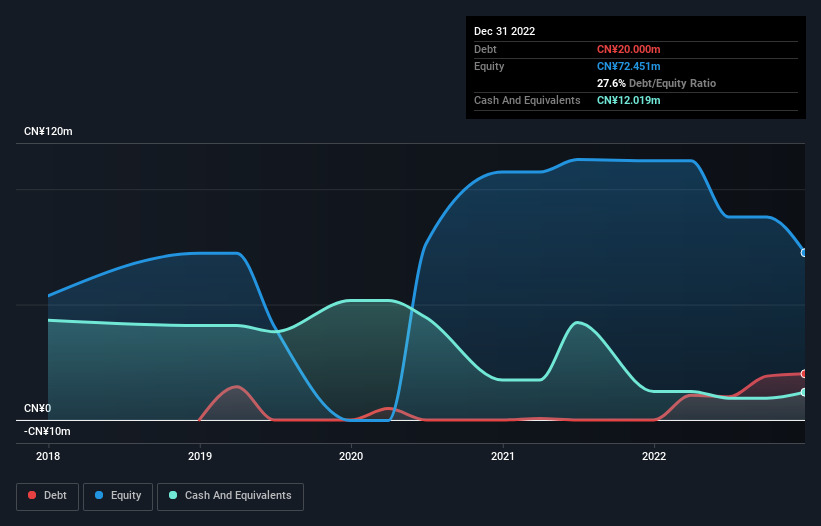
David Iben put it well when he said, 'Volatility is not a risk we care about. What we care about is avoiding the permanent loss of capital.' When we think about how risky a company is, we always like to look at its use of debt, since debt overload can lead to ruin. We note that Icon Culture Global Company Limited (HKG:8500) does have debt on its balance sheet. But should shareholders be worried about its use of debt?
Why Does Debt Bring Risk?
Debt is a tool to help businesses grow, but if a business is incapable of paying off its lenders, then it exists at their mercy. Part and parcel of capitalism is the process of 'creative destruction' where failed businesses are mercilessly liquidated by their bankers. However, a more common (but still painful) scenario is that it has to raise new equity capital at a low price, thus permanently diluting shareholders. Having said that, the most common situation is where a company manages its debt reasonably well - and to its own advantage. The first thing to do when considering how much debt a business uses is to look at its cash and debt together.
Check out our latest analysis for Icon Culture Global
What Is Icon Culture Global's Net Debt?
As you can see below, at the end of December 2022, Icon Culture Global had CN¥20.0m of debt, up from none a year ago. Click the image for more detail. However, because it has a cash reserve of CN¥12.0m, its net debt is less, at about CN¥7.98m.

How Strong Is Icon Culture Global's Balance Sheet?
We can see from the most recent balance sheet that Icon Culture Global had liabilities of CN¥64.9m falling due within a year, and liabilities of CN¥3.68m due beyond that. Offsetting this, it had CN¥12.0m in cash and CN¥106.0m in receivables that were due within 12 months. So it can boast CN¥49.4m more liquid assets than total liabilities.
This surplus strongly suggests that Icon Culture Global has a rock-solid balance sheet (and the debt is of no concern whatsoever). Having regard to this fact, we think its balance sheet is as strong as an ox. There's no doubt that we learn most about debt from the balance sheet. But it is Icon Culture Global's earnings that will influence how the balance sheet holds up in the future. So when considering debt, it's definitely worth looking at the earnings trend. Click here for an interactive snapshot.
In the last year Icon Culture Global had a loss before interest and tax, and actually shrunk its revenue by 61%, to CN¥69m. To be frank that doesn't bode well.
Caveat Emptor
While Icon Culture Global's falling revenue is about as heartwarming as a wet blanket, arguably its earnings before interest and tax (EBIT) loss is even less appealing. Its EBIT loss was a whopping CN¥46m. Having said that, the balance sheet has plenty of liquid assets for now. That should give the business time to grow its cashflow. While the stock is probably a bit risky, there may be an opportunity if the business itself improves, allowing the company to stage a recovery. When analysing debt levels, the balance sheet is the obvious place to start. But ultimately, every company can contain risks that exist outside of the balance sheet. Be aware that Icon Culture Global is showing 2 warning signs in our investment analysis , you should know about...
If, after all that, you're more interested in a fast growing company with a rock-solid balance sheet, then check out our list of net cash growth stocks without delay.
New: AI Stock Screener & Alerts
Our new AI Stock Screener scans the market every day to uncover opportunities.
• Dividend Powerhouses (3%+ Yield)
• Undervalued Small Caps with Insider Buying
• High growth Tech and AI Companies
Or build your own from over 50 metrics.
Have feedback on this article? Concerned about the content? Get in touch with us directly. Alternatively, email editorial-team (at) simplywallst.com.
This article by Simply Wall St is general in nature. We provide commentary based on historical data and analyst forecasts only using an unbiased methodology and our articles are not intended to be financial advice. It does not constitute a recommendation to buy or sell any stock, and does not take account of your objectives, or your financial situation. We aim to bring you long-term focused analysis driven by fundamental data. Note that our analysis may not factor in the latest price-sensitive company announcements or qualitative material. Simply Wall St has no position in any stocks mentioned.
About SEHK:8500
Icon Culture Global
An investment holding company, engages in the provision of integrated multimedia advertising and marketing solution services in the People’s Republic of China.
Excellent balance sheet moderate.
Market Insights
Community Narratives




